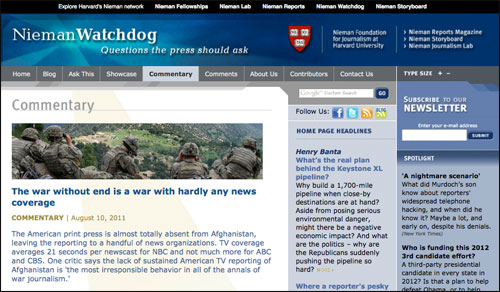Nieman Watchdog Project

During the past year, Nieman Watchdog reached out, in line with the basic principles of the Nieman Foundation and as part of our mission, to encourage and push for better public policy reporting. A lot of good journalism is being practiced but there is still a lot more to do. Staff and news hole cuts are not justification for weak reporting or for ignoring important stories, and we aim to remind editors and reporters of that.
Our regular beats are ones that are important to the public but that are covered weakly if at all by most news organizations. They include Afghanistan; clearer economic reporting, especially on politics and the economy; poverty in America; the legal justice system; broadband and the telecoms and some largely under-covered issues from the Bush administration, such as torture, and First Amendment issues generally, including the First Amendment aspects of the Occupy movement. In addition to regular and occasional online visitors, we have about 5,000 subscribers to our online newsletter, including many leading editors and other journalists, as well as concerned citizens.
Nieman Watchdog has received recognition from a number of leaders and organizations in American journalism for the reliable watchdog reporting that we provide. Some highlights from the year:
-
John Hanrahan, a highly skilled, veteran reporter and former executive director of The Fund for Investigative Journalism who works for us on temporary assignment, wrote leading-edge reports on Afghanistan and on citizen protest in America, exposing weak mainstream coverage of those topics and citing ways to improve it.
-
We ran innovative, against-the-grain stories on educational reform, including one written by a leading educator, Diane Ravitch, and others for which she served as adviser to a contributor.
-
We developed our presence on Twitter and Facebook to increase our social media outreach. The Watchdog Twitter page has more than 1,260 followers and has logged more than 720 tweets – #newsq – in the few months since we started.
-
More than 100 leading graphics editors worldwide came to the site to take part in a petition calling for more responsible, valid infographics.
-
Newspaper editors asked us to bring attention to special investigative pieces by their staff and we were able to provide a forum for those important stories.
-
We continued to focus on broadband and the FCC’s controversial regulation of the large communications corporations. In this regard, groundbreaking stories we did in past years on the co-opting of citizen groups by the big telecoms recently have come very much to the fore in The New York Times, the Center for Public Integrity, and other news organizations.
-
We wrote about the questionable role Iowa has been given in Republican presidential politics. Similarly, years ago we reported on a little-known Washington, D.C. group, the American Legislative Executive Council (ALEC), as being the hidden hand behind right-wing bills being introduced in legislatures across America. Recently ALEC received wide coverage as Republican governors and lawmakers in Wisconsin, Ohio, Florida, and elsewhere, working from similar scripts, enacted anti-union laws and voter registration restrictions.
-
In the blog section of the site, we had a mix of sharp observations and thoughtful, personal recollections by veteran news people.
-
In October, Paul Krugman brought attention to us, writing: “Nieman Watchdog has a very good piece by John Hanrahan about press coverage of the Occupy Wall Street demonstrations. Coverage was initially dismissive and minimal — and mea culpa, I wasn’t paying attention myself.” The reference brought us several thousand new readers.
-
Occasionally, we repost articles or columns from the highly regarded newsletter group that publishes Tax Analysts and Tax Notes. We did that with pieces by Pulitzer Prize-winning journalist and author David Cay Johnston (now with Reuters), who also wrote several pieces exclusively for Nieman Watchdog.
In the coming year, we plan to pay special attention to the election process, specifically the security of voter machines, voter registration issues, and other stories of value to both large and smaller news organizations. We additionally will urge the mainstream media not to settle for he-said, she-said reporting.
Also high on our wish list is the desire for better participation in Watchdog by Nieman alumni; all suggestions to that end would be most appreciated.
Barry Sussman
Editor, Nieman Watchdog
Read Nieman Watchdog story highlights from 2011 »
The Nieman Watchdog Project began in the mid-1990s. It was conceived and funded by Murrey Marder, a 1950 Nieman Fellow. For several years it conducted conferences, in Boston or Washington, D.C., with leading journalists, academics, and political figures as speakers and panelists. NiemanWatchdog.org went online in 2004. More than 300 contributors have taken part, writing on virtually all public-policy issues. Barry Sussman is the editor; Dan Froomkin is deputy editor. Morton Mintz, (Nieman 1964), has been a senior adviser to the Watchdog Project from its outset.